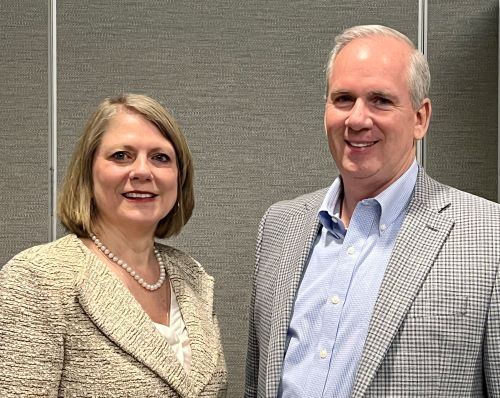Pro tips for using Zoom in virtual courtroom proceedings

Heidi Barcus is a shareholder at Lewis Thomason, and Brian McCann is vice president and general manager of Veritext Legal Solutions. Photo by Julianne Hill.
Three years into a pandemic full of uncertainties, one thing is clear—virtual legal proceedings are here to stay. Now, attorneys are expected to control the nuances of Zoom to create the most impact.
To avoid virtual disasters such as using a cat filter during a court proceeding or the Skype bombing of the George Zimmerman trial, a type of preparation never necessary for in-person proceedings now must be part of the practice, says Brian McCann, vice president and general manager of Veritext Legal Solutions, a Livingston, New Jersey-based court reporting agency.
He offered pro tips in his presentation, “Using Zoom in the Courtroom Effectively,” at the ABA Techshow 2023 on Thursday.
Creating secure, smooth and seamless presentations via Zoom that don’t distract judges, juries or the attorney presenting is key, he said.
McCann emphasized that basics matter. Consider what the audience—the judge and the jury—will see and hear. Inappropriate book titles in the background can send the wrong message. Virtual assistants can interrupt. Bad lighting or sound can make the audience work too hard. Plug into a router at home during trials instead of relying on unpredictable Wi-Fi.
“A lot of this really comes down to common sense. But if you don’t anticipate it and think about it, it can be off putting,” he said.
Another important issue is eliminating concerns about off-camera coercion or coaching. In a deposition, “I want the lawyer on the other side to be on camera, as well as a witness, so I can see what’s going on,” said Heidi Barcus, a Knoxville, Tennessee-based shareholder at Lewis Thomason. “There’s too much of this malarkey happening with remote depositions.”
Remember that some clients will need extra help. Barcus deposed an elderly woman in a nursing home in Portland, Oregon, and that situation demanded extra preparation.
“She isn’t going to be able to figure out how to turn the volume on. She has some sketchy Wi-Fi—and how do we get through that?” she said.
Consider security too.
“It’s a big deal,” McCann added.
Disable chat and recording. Zoom has encryption capabilities, and it offers a different version with tighter security for government proceedings.
To avoid one party accusing the other of not offering access to documents or taking them off screen too quickly, McCann recommended having a third party, such as the court, control the platform.
Follow along with the ABA Journal’s coverage of the ABA Techshow 2023 here.
Presenting exhibits gets tricky. File sharing via a virtual platform is great—unless that file is corrupted. McCann suggested using cloud-based services, such as Box, Dropbox or Google Drive to avoid issues.
Setting up a second device dedicated to showing exhibits streamlines the often-clunky and time-consuming task of screen sharing, Barcus added.
Sometimes lawyers send physical documents to opposing counsel but demand that the envelope be opened on camera.
“In a smoking-gun exhibit, you don’t want your adversary to prepare for something if the element of surprise is really critical to your presentation,” McCann said.
That takes forethought.
“The technology isn’t going to make it happen—you have to make it happen,” McCann said.
Lawyers must use the technology to their advantage, he added.
“Master it. Understand, anticipate and be prepared,” he said. “Prepare your clients and your witnesses because it’s not just you—it’s the folks that are with you that also need to be ready for the new world.”



